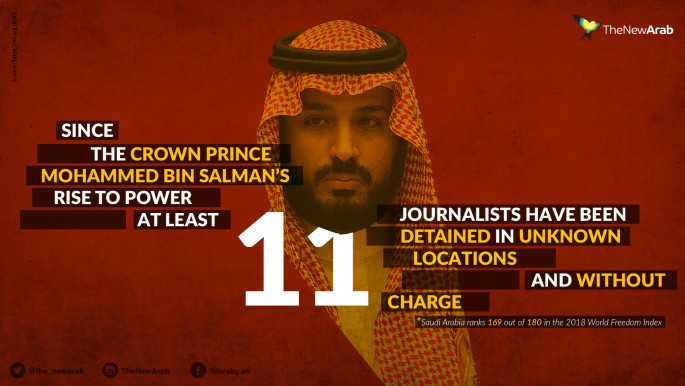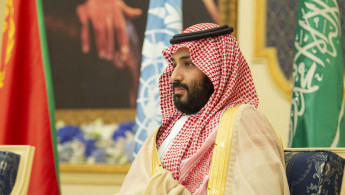Lies, murder and deceit: the daily reality of Mohammed Bin Salman's war on dissent
Prominent Saudi journalist Jamal Khashoggi disappeared on 2 October after entering his country's consulate in Istanbul. He had been living in self-imposed exile in the United States since last year to avoid possible arrest.
Khashoggi had been critical of some policies of Saudi Crown Prince Mohammed bin Salman and Riyadh's intervention in the war in Yemen.
Turkish police believe he was murdered inside the consulate by a Saudi team sent to Istanbul.
The Saudi consulate rejected claims that the journalist was killed there as "baseless".
Amnesty International said that if reports of the planned assassination were true, it would set an "abysmal new low" in Saudi Arabia's suppression of the freedom of expression.
 |
Bin Salman has sought to consolidate his power under the guise of economic and social liberalisation, detaining economists, bloggers, intellectuals, clerics and rights activists |  |
"The Gulf Kingdom routinely uses draconian laws to crack down on peaceful dissent at home, and has even arrested dissidents abroad in the past," the group said in a statement.
"But the enforced disappearance – and now reported assassination – of one of its citizens who had sought asylum abroad should set alarm bells ringing".
War and blockade
With little experience in government, the young Mohammed bin Salman, known as MbS, has risen to power in just three years to oversee all major aspects of politics, security and the economy in Saudi Arabia.
 |
|
| [Click to enlarge] |
As defence minister, Bin Salman launched a devastating military campaign in Yemen in 2015, which has killed more than 10,000 civilians and created what the UN calls the world's "worst humanitarian disaster".
In late June 2017, Saudi King Salman installed his son Mohammed bin Salman as crown prince, replacing the king's nephew, Mohammed bin Nayef, as successor to the throne.
Just weeks prior to being named as crown prince, Bin Salman spearheaded the blockade of Qatar, which began on 6 June.
All land, sea, and air links to Qatar were closed.
Since then, nurturing the public profile of a reformer, he has sought to consolidate his power under the guise of economic and social liberalisation, detaining economists, bloggers, intellectuals, clerics and rights activists.
Wave of arrests
In September 2017, more than 20 influential clerics and intellectuals were detained for allegedly acting on behalf of "foreign parties".
One such detainee was reformist cleric Salman al-Awdah, whose detention appeared to result from a tweet endorsing warmer relations with Qatar.
 |
Khashoggi had been living in self-imposed exile in the United States since last year to avoid possible arrest |  |
Earlier this year, Awdah was hospitalised after being held in solitary confinement for over five months. Last month, Saudi public prosecutors called for the death penalty for the moderate cleric when his trial opened in Riyadh.
It was amid this wave of arrests in September 2017 that Khashoggi went into self-exile, with Amnesty International saying the journalist would have been in "serious danger" amid a pattern of arbitrary detentions, unfair trials, and lengthy prison sentences.
'Corruption purge'
In November 2017, several months after announcing the end of a driving ban on women, bin Salman detained over 200 top Saudi officials and businessmen in a purported anti-corruption drive in the country.
Experts say it was also a way of consolidating his grip on power.
Twitter Post
|
The detainees were held at the luxury Ritz-Carlton hotel in Riyadh after being arrested, with the majority striking monetary settlements in exchange for their freedom.
Those who did not reach financial settlements could face trial.
At last 17 detainees were hospitalised for physical abuse, while a Saudi military officer later died in custody after reportedly being tortured, the New York Times reported.
That same month, bin Salman was heavily criticised when he was accused of placing Lebanese Prime Minister Saad Hariri under house arrest in Riyadh and forcing him to resign.
France intervened and Hariri returned via Paris to Lebanon, where he reversed his resignation.
Crackdown on activists
In May 2018, just one month before the driving ban on women was lifted, at least 12 leading female rights activists were detained without charge in Saudi Arabia.
The activists had campaigned for the right to drive and the end of the repressive male guardianship system in Saudi Arabia for many years.
Saudi officials accused the women of "suspicious contact with foreign parties" and undermining "stability".
 |
In May, just one month before the driving ban on women was lifted, at least 12 leading female rights activists were detained without charge in Saudi Arabia |  |
In August, Saudi authorities detained at least another two female activists, including Samar Badawi and Nassima al-Sadah.
Badawi is the sister of jailed blogger Raif Badawi, who is serving a 10-year sentence for his online activism.
Following criticism of Samar Badawi's arrest by Canada, Saudi Arabia expelled the Canadian ambassador and withdrew thousands of Saudi students studying in Canada.
Riyadh also threatened to freeze all new trade deals with Ottawa.
In the same month, Riyadh said it was also seeking the death penalty against five human rights activists, including Israa al-Ghomgham, the first female activist to possibly face the death penalty for her human rights work.
Ghomgham, a prominent Shia activist who documented mass demonstrations in the Eastern Province starting in 2011, was arrested at her home along with her husband in December 2015.
Follow us on Twitter: @The_NewArab



